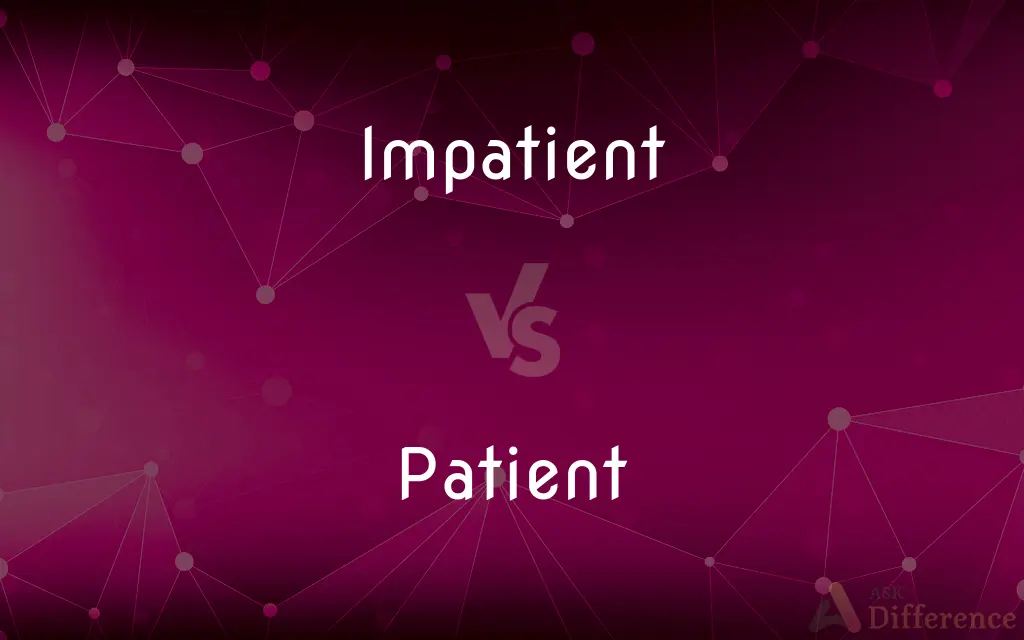Impatient vs. Patient — What's the Difference?
By Tayyaba Rehman & Maham Liaqat — Updated on April 26, 2024
Impatient people often show eagerness or annoyance due to delays, while patient individuals calmly endure waiting or difficulties without complaint.

Difference Between Impatient and Patient
Table of Contents
ADVERTISEMENT
Key Differences
Impatient individuals frequently display a low tolerance for delays or waiting, which can lead to feelings of frustration and irritability. On the other hand, patient people are characterized by their high tolerance for waiting and their ability to manage delay or adversity calmly and without agitation.
Impatience can result in a hasty decision-making process, where decisions are made quickly, often without full consideration of the consequences. Whereas, patience allows for more thoughtful and considered decisions, reflecting a more deliberate and often more effective approach to problem-solving.
At the workplace, impatient behavior can be perceived as dynamic, but it might risk overlooking important details or rushing through tasks. Conversely, patient employees are seen as thorough and careful, typically delivering work of higher quality due to their meticulous attention to detail.
In terms of personal development, impatience can hinder growth as it limits one's ability to persevere through learning curves or setbacks. Patient individuals, however, tend to experience more sustained and substantial growth, as they are more likely to embrace challenges and learn from them.
Comparison Chart
Response to Delay
Shows frustration or annoyance
Endures calmly without complaint
ADVERTISEMENT
Decision-making
Often hasty and less considered
Deliberate and thorough
Social Interactions
May lead to conflicts or misunderstandings
Fosters understanding and resilience
Workplace Behavior
Perceived as dynamic but possibly careless
Seen as meticulous and quality-focused
Personal Development
May hinder growth due to lack of perseverance
Facilitates sustained growth through challenges
Compare with Definitions
Impatient
Having a short temper.
His impatient tone made everyone uneasy.
Patient
Showing self-control.
He remained patient throughout the lengthy process.
Impatient
Intolerant of anything that delays.
He was impatient with any sort of inefficiency.
Patient
Steady perseverance.
His patient pursuit of the goal paid off.
Impatient
Easily annoyed by delays.
She was impatient with the slow progress of the project.
Patient
Not hasty or impetuous.
She made a patient effort to resolve all the issues.
Impatient
Demanding quick action.
She became impatient with their indecision.
Patient
Enduring difficult conditions without complaint.
They were patient under the harsh working conditions.
Impatient
Unable to wait patiently or tolerate delay; restless.
Patient
A patient is any recipient of health care services that are performed by healthcare professionals. The patient is most often ill or injured and in need of treatment by a physician, nurse, psychologist, dentist, veterinarian, or other health care provider.
Impatient
Unable to endure irritation or opposition; intolerant
Impatient of criticism.
Patient
Bearing or enduring pain, difficulty, provocation, or annoyance with calmness
Tried to remain patient when the airline announced the flight was delayed.
Impatient
Expressing or produced by impatience
An impatient scowl.
Patient
Marked by or exhibiting calm endurance of pain, difficulty, provocation, or annoyance
Responded to the accusations with a patient smile.
Impatient
Restively eager or desirous; anxious
Impatient to begin.
Patient
Tolerant; understanding
An unfailingly patient leader and guide.
Impatient
Restless and intolerant of delays.
Patient
Persevering; constant
With patient industry, she revived the failing business and made it thrive.
Impatient
Anxious and eager, especially to begin something.
Patient
Capable of calmly awaiting an outcome or result; not hasty or impulsive.
Impatient
(obsolete) Not to be borne; unendurable.
Patient
Capable of bearing or enduring pain, difficulty, provocation, or annoyance
“My uncle Toby was a man patient of injuries” (Laurence Sterne).
Impatient
Prompted by, or exhibiting, impatience.
Impatient speeches or replies
Patient
One who receives medical attention, care, or treatment.
Impatient
Not patient; not bearing with composure; intolerant; uneasy; fretful; restless, because of pain, delay, or opposition; eager for change, or for something expected; hasty; passionate; - often followed by at, for, of, and under.
A violent, sudden, and impatient necessity.
Fame, impatient of extremes, decaysNot more by envy than excess of praise.
The impatient man will not give himself time to be informed of the matter that lies before him.
Dryden was poor and impatient of poverty.
Patient
(Linguistics) A noun or noun phrase identifying one that is acted upon or undergoes an action. Also called goal.
Impatient
Not to be borne; unendurable.
Patient
(Obsolete) One who suffers.
Impatient
Prompted by, or exhibiting, impatience; as, impatient speeches or replies.
Patient
(of a person) Willing to wait if necessary; not losing one's temper while waiting.
Be patient: your friends will arrive in a few hours.
Impatient
One who is impatient.
Patient
Constant in pursuit or exertion; persevering; calmly diligent.
Patient endeavour
A patient wait
Patient analysis
Impatient
Restless or short of temper under delay or opposition;
Impatient with the slower students
Impatient of criticism
Patient
(obsolete) Physically able to suffer or bear.
Impatient
(usually followed by `to') full of eagerness;
Impatient to begin
Raring to go
Patient
A person or animal who receives treatment from a doctor or other medically educated person.
Impatient
Restlessly eager.
He is always impatient for the meeting to end so he can leave.
Patient
The noun or noun phrase that is semantically on the receiving end of a verb's action.
The subject of a passive verb is usually a patient.
Patient
One who, or that which, is passively affected; a passive recipient.
Patient
Having the quality of enduring; physically able to suffer or bear.
Patient of severest toil and hardship.
Patient
Undergoing pains, trials, or the like, without murmuring or fretfulness; bearing up with equanimity against trouble; long-suffering.
Patient
Constant in pursuit or exertion; persevering; calmly diligent; as, patient endeavor.
Whatever I have done is due to patient thought.
Patient
Expectant with calmness, or without discontent; not hasty; not overeager; composed.
Not patient to expect the turns of fate.
Patient
Forbearing; long-suffering.
Be patient toward all men.
Patient
One who, or that which, is passively affected; a passive recipient.
Malice is a passion so impetuous and precipitate that it often involves the agent and the patient.
Patient
A person under medical or surgical treatment; - correlative to physician or nurse.
Like a physician, . . . seeing his patient in a pestilent fever.
Patient
To compose, to calm.
Patient
A person who requires medical care;
The number of emergency patients has grown rapidly
Patient
The semantic role of an entity that is not the agent but is directly involved in or affected by the happening denoted by the verb in the clause
Patient
Enduring trying circumstances with even temper or characterized by such endurance;
A patient smile
Was patient with the children
An exact and patient scientist
Please be patient
Patient
Enduring without protest or complaint
Patient
Able to accept or tolerate delays without getting annoyed.
She was patient with the new trainees.
Common Curiosities
How does impatience manifest in daily activities?
Impatience can be seen when someone expresses annoyance at minor delays or inefficiencies.
Can impatience affect work quality?
Yes, impatience can lead to rushing tasks and potentially lower quality work.
How does patience affect decision-making?
Patience contributes to more thorough and thoughtful decision-making.
What social benefits does patience offer?
Patience fosters better relationships through resilience and understanding.
What are some strategies to develop patience?
Strategies include mindfulness practices, setting realistic expectations, and practicing empathy.
What is the key emotional trait of an impatient person?
Impatient individuals often exhibit irritability and frustration.
Is being impatient always negative?
Not necessarily; impatience can drive quick action in situations requiring immediate results.
Why is patience valued in professional settings?
Because it often leads to better decision-making and higher quality outcomes.
How do patient people handle stress?
Patient individuals generally manage stress by maintaining a calm and steady demeanor.
What are the risks of being too patient?
Excessive patience might lead to missed opportunities or being taken advantage of.
Can patience influence leadership effectiveness?
Yes, patience can enhance leadership effectiveness through more considered decisions and better conflict management.
How does impatience affect learning?
Impatience can hinder the learning process by discouraging persistence in face of challenges.
Share Your Discovery

Previous Comparison
Leopard vs. Hyena
Next Comparison
Villa vs. CottageAuthor Spotlight
Written by
Tayyaba RehmanTayyaba Rehman is a distinguished writer, currently serving as a primary contributor to askdifference.com. As a researcher in semantics and etymology, Tayyaba's passion for the complexity of languages and their distinctions has found a perfect home on the platform. Tayyaba delves into the intricacies of language, distinguishing between commonly confused words and phrases, thereby providing clarity for readers worldwide.
Co-written by
Maham Liaqat















































